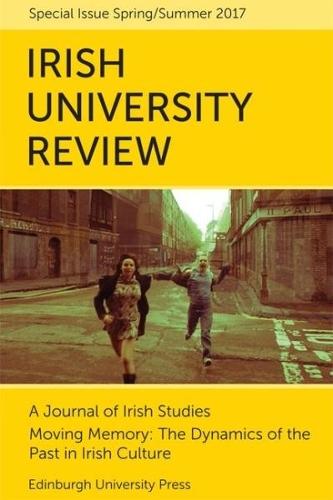Overview
A Special Issue that focuses on the ways that memory moves transculturally and transhistorically, and how it moves us, emotionally and politically. This Special Issue of Irish University Review considers the themes and forms of remembrance in Irish culture from the seventeenth century to the present moment, from oral depositions to video games, including the perspectives of academic critics and culture makers. These essays and responses consider the ways that memory moves transculturally and transhistorically, and how it moves us, emotionally and politically. Key Features Re-ignites ongoing discussions about the different forms of memory in Irish culture.Offers a vast range of articles that discuss issues such as LGBT testimonies, famine, post-conflict Northern Ireland, hunger strikes and migration.Examines a wide range of subjects within the formats of fiction, poetry, videogames and television.
Full Product Details
Author: Emilie Pine (Lecturer, University College Dublin)
Publisher: Edinburgh University Press
Imprint: Edinburgh University Press
ISBN: 9781474424363
ISBN 10: 1474424368
Pages: 232
Publication Date: 15 May 2017
Audience:
Professional and scholarly
,
Professional & Vocational
Format: Paperback
Publisher's Status: Active
Availability: In Print 
This item will be ordered in for you from one of our suppliers. Upon receipt, we will promptly dispatch it out to you. For in store availability, please contact us.
Table of Contents
Emilie Pine, Introduction: Moving Memory Paula Meehan, Three Poems from Geomantics (2016) Kathryn Kirkpatrick, Memory in Paula Meehan’s Geomantics (2016) Naomi McAreavey, Portadown, 1641: Memory and the 1641 Depositions Oona Frawley, Edmund Spenser and Transhistorical Memory in Ireland Marguérite Corporaal, Moving towards Multidirectionality: Famine Memory, Migration and the Slavery Past in Fiction, 1860-1890 Joseph Lennon, ‘Dreams that hunger makes’: Memories of Hunger in Yeats, Mangan, Speranza, and Irish Folklore Graham Dawson, The Meaning of ‘moving on’: From Trauma to the History and Memory of Emotions in ‘post-conflict’ Northern Ireland Stefanie Lehner,‘Parallel Games’ and Queer Memories: Performing LGBT Testimonies in Northern Ireland Úna Kavanagh and Louise Lowe, The Work of Anu: The Audience is Present Claire Lynch, ‘Everything not saved will be lost’: Videogames, Violence, and Memory in Contemporary Irish Fiction Fionnuala Dillane, Breaking Memory Modes: Anne Enright’s and Tana French’s Silent Interruptions
Reviews
Author Information
Emilie Pine is Lecturer in Modern Drama at University College Dublin and Director of the Irish Memory Studies Research Network
Tab Content 6
Author Website:
Customer Reviews
Recent Reviews
No review item found!
Add your own review!
Countries Available
All regions
|




